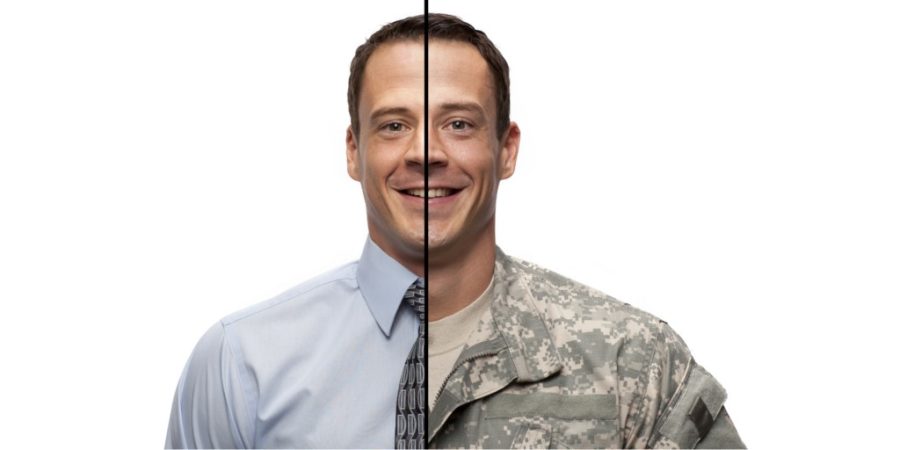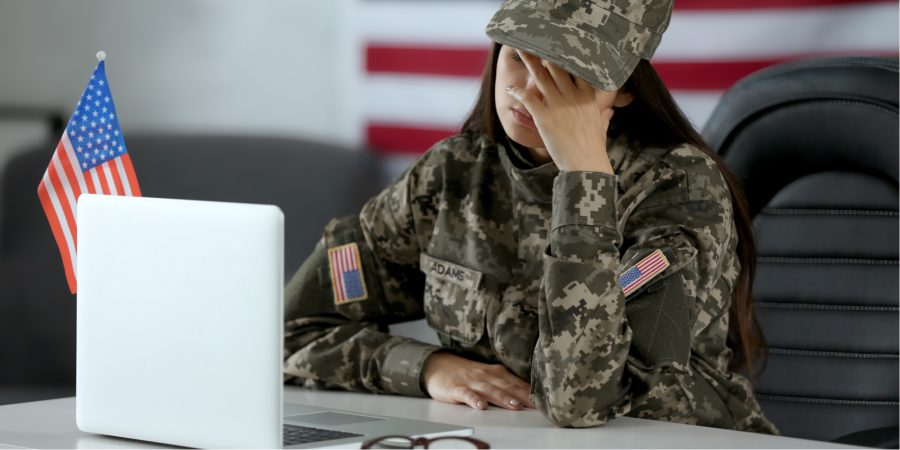
When it’s time to leave the military service world, many veterans like you or your loved one find it incredibly challenging to transition into civilian life. How will you apply military experience to a civilian job? Do you need mental health or addiction treatment? And what will the transition into civilian life look like socially and personally?
Here, we break down five tips for military transition to civilian life so that you can ease your way from simply surviving to thriving.
Table of Contents
1. Expect A Challenge

It’s no secret that military transitions to civilian life can be frightening. Whether you or your loved one is returning from the marine corps, national guard, or other area of military experience, there is going to be an adjustment period in all aspects of life. But why is it so challenging?
Simply put, there’s a reason why we call it “civilian life.” Typical civilian life usually does not involve daily danger, military responsibilities, or a need to go into survival mode. On the other hand, as a service member, you are used to having to work to keep yourself and your team safe. You have a mission and a specific purpose.
Upon return to civilian life, you might feel aimless or unsure of how to apply your military experience during a job hunt, a date, or even spending time with your family members. Know that this is common for veterans who are no longer on active duty. Your body and mind need time to process that you are no longer in service mode.
Research shows that nearly 30 percent of veterans have a challenging time during the transition into civilian life. Out of this percentage, a majority of veterans went through some type of traumatic experience while on active duty. Things like combat exposure, injury, military sexual trauma, and experiencing other life-changing events can make it much more challenging for veterans transitioning to civilian life.
This is why the first step in having a successful transition into civilian life is to anticipate common struggles for veterans coming out of active duty. These include social, familial, financial, and work-related aspects of civilian life.
If you are able to anticipate a challenge, then you will be better prepared to apply strategies to overcome these common struggles. Having the right support system, therapies, and treatments in place can help to make a military transition to civilian life much easier.
2. Look for Employers Hiring Veterans
Another essential tip in making the transition into civilian life less of a struggle is to find employers who are actively hiring veterans. If you are on the job hunt for something military service related, try researching for a veteran job through recruiting websites. In many cases, employers will specify if they encourage veterans to apply.
Not only will veteran-friendly employers be able to recognize the potential challenges you or your loved one might face during this transition time, but they will also be able to see the incredible assets you bring to many different roles.
Even if you aren’t looking for a military-related job, military experience makes you unique as a candidate. There are ways to boost your resume using the skills that you already have. Be sure to highlight military experience such as:
- Awards and medals
- Ability to work under pressure
- Thinking on your feet
- Following directions
- Meeting managerial expectations
- Time management
- Specific technical skills
Your military experience makes you a well-rounded person in all areas of your life. Though returning to civilian life can be tricky, it’s important to remember that you bring valuable assets to the workplace and beyond.
3. Use a Military Transition Assistance Program (TAP)
Being on the job hunt, easing into social situations, and figuring out civilian life in general does not have to be a process that you go through alone. The U.S. Department of Veterans Affairs assists about 200,000 veterans with the transition into civilian life annually through their Transition Assistance Program (TAP).
TAP is specifically made to help service members switch from service mode to civilian life. The lessons that you learn in TAP go through the common struggles veterans face as well as strategies on how to approach these challenges when they come up.
4. Veterans and Their Families Should Attend Therapy Together

In addition to government-assisted programs like TAP, one of the most beneficial services is family counseling. After all, the transition to civilian life does not just affect the service member. If you are a military spouse, for example, you might also be wondering how to help your loved one transition back into civilian life.
Sometimes, it can be difficult to recognize if a veteran you know is struggling with the return to civilian life. They might seem in good spirits or they might not speak much about their service. On the outside, this behavior makes it look as though they have everything “under control,” so to speak. However, this is often far from the truth.
Upon returning to civilian life, veterans frequently come face to face with issues of mental health disorders, post-traumatic stress disorder, and even substance abuse. This can be extremely frustrating for both veterans and their families because you all want the transition to go smoothly. The health and happiness of your loved one is the top priority.
Thus, family therapy is an extremely beneficial resource that some veteran-centered treatment facilities offer. In family counseling sessions, veterans and their families work together to understand how active duty and service can greatly impact one’s military transition to civilian life.
These family sessions focus specifically on:
- Creating an environment of support
- Curating conversations and helpful communication skills
- Understanding potential mental health disorders
- Recognizing signs of substance abuse
- Making the transition to civilian life easier for veterans and their families
The process of transitioning out of service is complicated, but with the support of family, loved ones, and mental health professionals, veterans can (and will) have a successful switch to civilian life.
5. Be Aware of Mental Health Symptoms and Seek Treatment
Most importantly out of all of these tips on returning to civilian life is to be mindful of mental health symptoms as they arise. Though not all active duty members experience trauma or are exposed to combat, there are countless ways that your military service can impact your mental health.
Conditions like post-traumatic stress disorder, anxiety, depression, and addiction to drugs or alcohol are becoming more and more common in veterans. All of these make the transition to civilian life much more challenging, especially when they go untreated.
Be aware of the many signs and symptoms of mental health conditions as you or your loved one returns from active duty. They might not appear right away and the symptoms can always change or worsen. Seeking treatment for these conditions can make all the difference when it comes to easing back into civilian life.
Heroes’ Mile Can Help with Your Transition to Civilian Life
Heroes’ Mile is a treatment center located in Florida that is made for veterans by veterans. Our goal is to give you the necessary tools you need to have a safer, healthier, and happier transition to civilian life.
For more information on all of the services we offer, including supervised detox, family therapy approaches, and more, reach out to us at 888-838-6692. You can also fill out our confidential form online today. Remember, you aren’t in this alone–we’re here to help you find your footing on new ground.
The post 5 Tips for Military Transitions to Civilian Life appeared first on Heroes’ Mile Veterans Recovery Center.
Source
Original Author: Heroes’ Mile

